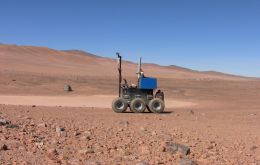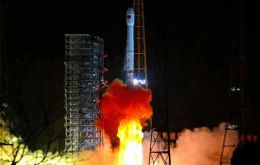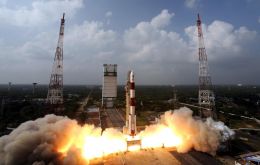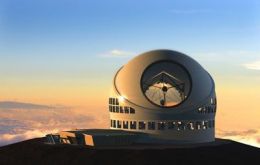MercoPress. South Atlantic News Agency
Tag: space
-
Wednesday, June 9th 2021 - 09:41 UTC
Bezos will fly to outer space in his Blue Origin New Shepard rocket on July 20

Jeff Bezos, the founder and CEO of the multi-national technology Amazon will fly to space next month on the first space flight from his rocket company Blue Origin, the billionaire said.
-
Saturday, March 2nd 2019 - 06:51 UTC
Mars rover work-out controlled in Chile from more 11.000km away in UK

A space control center in the UK has been used to test-drive a prototype Mars rover thousands of miles away in Chile’s Atacama desert. Experts at the European Space Agency’s centre in Oxfordshire completed a series of tests across nearly 11,000 km in order to see how the Mars rover reacts to commands across large distances.
-
Thursday, February 14th 2019 - 10:11 UTC
Mars exploration NASA pioneer robot officially “dead” after 14 years

During 14 years of intrepid exploration across Mars, it advanced human knowledge by confirming that water once flowed on the red planet - but NASA's Opportunity rover has analyzed its last soil sample. The robot has been missing since the US space agency lost contact during a dust storm in June last year and was declared officially dead on Wednesday, ending one of the most fruitful missions in the history of space exploration.
-
Saturday, January 19th 2019 - 09:18 UTC
Argentina/China companies link up to launch satellites for an Earth-observation constellation

An international space venture called Satellogic says it will have 90 satellites launched by a Chinese company to create an Earth-observing constellation. The first launch by the China Great Wall Industry Corp. under the newly announced deal, scheduled for later this year, will deliver 13 satellites to low Earth orbit on China’s Long March 6 rocket, Satellogic announced in a news release.
-
Saturday, September 22nd 2018 - 08:30 UTC
Argentina ready to launch a satellite to monitor natural disasters and soil moisture

Argentina is launching a new microwave imaging satellite to monitor natural disasters and soil moisture, in a long-term bid to bolster the farm sector, an industry that has historically been the backbone of the country’s economy.
-
Friday, August 31st 2018 - 08:34 UTC
India announces its first manned space mission to cost US$1.4bn

India announced it expected to spend less than 100 billion rupees (US$1.43 billion) on its first manned space mission to be launched by 2022, suggesting it is likely to be cheaper than similar projects by the United States and China.
-
Monday, January 29th 2018 - 10:22 UTC
Ozone hole: NASA's satellite confirms 20% less depletion; recovery by 2080

Scientists have shown through direct satellite observations of the ozone hole that levels of ozone-destroying chlorine are declining. Measurements show that the decline in chlorine, resulting from an international ban on chlorine-containing man-made chemicals called chlorofluorocarbons (CFCs), has resulted in about 20% less ozone depletion during the Antarctic winter than there was in 2005, the first year that measurements of chlorine and ozone during the Antarctic winter were made by NASA's Aura satellite.
-
Wednesday, April 28th 2010 - 01:33 UTC
Chile Wins Bid for World’s Largest Telescope to be Built in Atacama Desert

Chile has won its bid for the world’s largest telescope to be constructed on its shores. The 42-metre European Extremely Large Telescope will be built in Chile’s north—3,060 meters above sea level on a mountain known as Armazonas.
-
Tuesday, April 20th 2010 - 14:56 UTC
Chile is the world’s leader in star gazing with the most powerful telescopes

Many of the world’s largest investments in the field of astronomy can be found in Chile for the same reasons that Cerro Armazones, in the Antofagasta region, may become home to a new telescope that would produce images 15 times shaper than the Hubble telescope.
